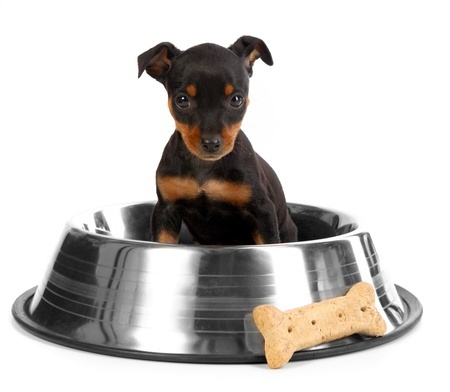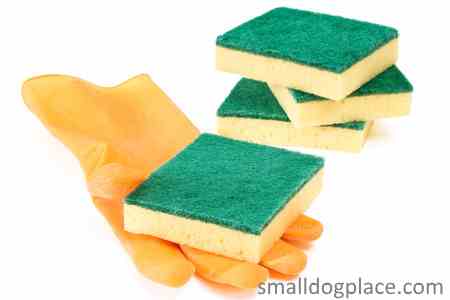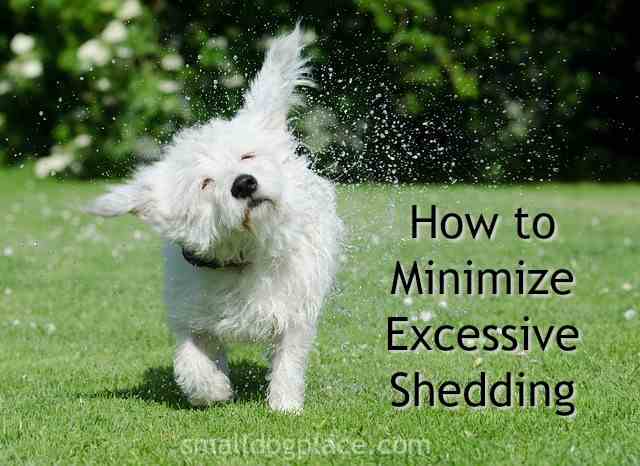- Small Dog Place Home
- Non-Shedding Breeds
- Dog Shedding
Got a Dog Shedding Problem?
3 Steps to Minimize that Excessive Dog Hair
Excessive dog shedding is one of the most common problems that every dog owner must face. All dogs shed, but some more so than others.
The problem has become so big, there are literally hundreds if not thousands of dog shedding solutions available on market today.
The solutions can vary from a simple vitamin to an expensive robotic vacuum to the most recent dog leotard. All of those solutions promise you just one thing:
To Stop Your Dog's Excessive Shedding!
Lucky for us who love small dogs, shedding is not nearly the problem as those who own large breed dogs. However, all that hair can become an extra chore when we would rather be playing with our furry friends.
No matter how expensive or how grandiose the solution might seem, there is nothing that you can do to completely stop your dog from shedding.
In the end, you just have to deal with the fact, shedding is a normal routine that happens in dog's life.
But don't worry, even though there's nothing that you can do to completely stop your dog from shedding, there are few cheap and simple things that you can do to minimize excessive shedding.
Is Your Dog a Seasonal or Year-Round Shedder?
If your dog sheds year round, you may not notice it as much as those that shed seasonally. Spring and fall are normally the times of the year that dogs shed their hair, but that varies from breed to breed.
Do All Dogs Shed?
There is a misconception that some dogs do not shed. All dogs shed, but they do so differently. There are three stages of shedding.
- Anagen phase: New hair grows in.
- Catagen phase: Once the new hair reaches the maximum length (deterined by genetics) the hair stops growing.
- Telogen phase: The hair neither grows nor falls out.
Some dog breeds remain in the Anagen phase where their hair continues to grow. Many of the long breed dogs fall into this catagory. Their hair continuously grows, but doesn't necessary fall out. Hair accumulates in the coat and must be brushed out or clipped. Dogs such as the Poodle, Maltese and Shih Tzu fall into this catagory.
Minimize Excessive Dog Shedding
Step 1 - Feed The Right Foods

It is common fact that 90% of dogs' health problems come from feeding un-proper foods or foods that fall short on optimal nutrition.
When it comes to minimizing dog shedding, the good news is you don't need to buy dog foods that cost hundreds of dollars, sometimes the solution can be as simple as giving more water to drink.
With that said, a good quality dog food will not only help your dog’s coat and skin, but will reap other very important health benefits too.
The addition of supplements may also help reduce the amount of shedding your dog experiences. Coconut oil, for example has helped reduce shedding by promoting a healthy skin and scalp.
Some owners prefer fish oil because it contains Omega 3 and Omega 6 fatty acids, ingredients that have been shown to promote a healthy hair coat.
Step 2: Kill Those Fleas and Ticks

Fleas and ticks are probably the number one factor that causes dogs to shed excessively. When your dog is infested with fleas and ticks, and you don't know what to do, just look at your kitchen and see if you have any of the following:
- Dawn dishwashing liquid
- Borax powder
- Lemon water
- Baking soda or vinegar
Those are the most effective and yet the cheapest solutions to kill fleas and ticks. AND, I’ll bet they are already in your kitchen pantry just waiting to be used.
Step 3 - Clean Up Your House

Trust me when I say, you don't need $1,000 Robotic vacuum to clean up your house from fur and loss hair.
Every time dog shedding season comes, and it is the time to clean up the house, all I needs are just rubber gloves, balloon, sponge, duct tape, and one hour of my time.
The balloon works like a magic to clean up your house from fur and loss hair. All you need to do just take any normal rubber balloon, blow it up, and rub it on the furniture. Then, the static electricity effect (I think that's what scientists call it) will do the rest.
My second favorite tool is a duct tape. It is fun and you can do it with your kids. What you need is a duct tape and paint roller cover.
Wrap the duct tape around a paint roller cover but with the sticky side facing out. Then roll the duct tape over your furniture.
Keep adding a new layer of duct tape over the first once covered in the fur. After finish, just cut off the duct tape and throw it away.
#4 Brush and Groom Your Dog
Brushing is extremely helpful to keep the excessive hair under control. Brushing three or four times a week for about five to ten minutes is recommended by the Texas AM University Veterinary Sciences. Using the correct brush is very important. For example a slicker brush is a good choice for poodles, where as a pin brush works well for dogs such as Yorkies, Maltese and Shih Tzu. A short hair dog benefits for a softer bristle brush or a rubber curry brush. Deshedding tools can also be helpful.
#5 Bathing
Bathing is important year-round, but especially during shedding seasons. Use a mild dog shampoo and bathe as frequently as once a week while hair is still coming out.
#6 Visit Your Veterinarian Regularly
Shedding is a normal part of life but to keep it under control, it's important to look at your dog's complete health profile. Regular vet visits can pick up issues before they become problems.
Keeping up to date with vaccines and preventatives will help keep your dog healthy. It's also worth noting that stress can also increase shedding, so if you fear your dog is stressed, consult your vet for a possible solution.
Conclusion
All dogs shed, some more so than others. Some shed hair year-round and it gets caught in the hair already on the body. These breeds need regular brushing and haircuts. Others shed seasonally leaving their hair everywhere they go. For these dogs, regular brushing, bathing, and supplements will help reduce the amount of shedding.
About Janice (author and voice behind this site)
Janice Jones has lived with dogs and cats for most of her life and worked as a veterinary technician for over a decade. She has also been a small-breed dog breeder and rescue advocate and holds academic training in psychology, biology, nursing, and mental health counseling. Her work focuses on helping dog owners make informed, responsible decisions rooted in experience, education, and compassion.
When not writing, reading, or researching dog-related topics, she likes to spend time with her six Shih Tzu dogs, her husband, and her family, as well as knitting and crocheting. She is also the voice behind Miracle Shih Tzu and Smart-Knit-Crocheting
Does This Article Deserve Your Thumbs Up?
We always appreciate your support and encouragement. Your thumbs up means so much to us. Please like this article.
If you find this page or any page on Small Dog Place Helpful, or useful in anyway, I'd love it if you would click the small heart found on the bottom right of each page.
You can also share or bookmark this page -- just click on the:

Free Monthly Newsletter
Sign Up for Our Free Newsletter and get our Free Gift to You.
my E-book, The Top 10 Mistakes People Make When Choosing a Dog (and how to avoid them)


